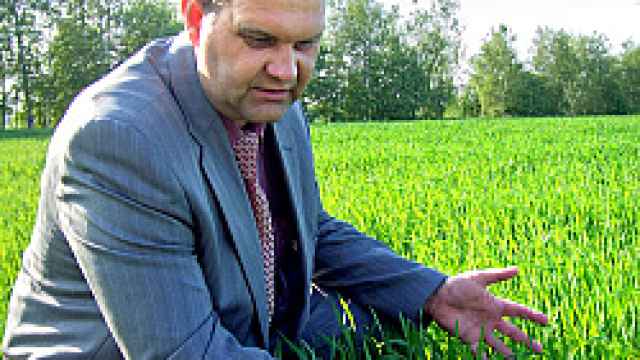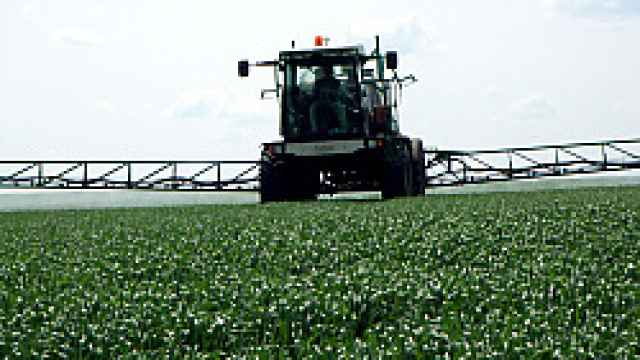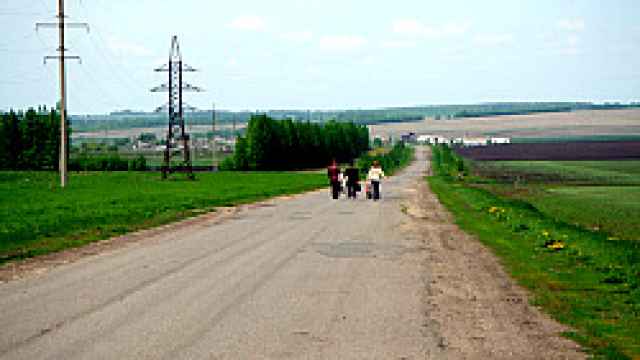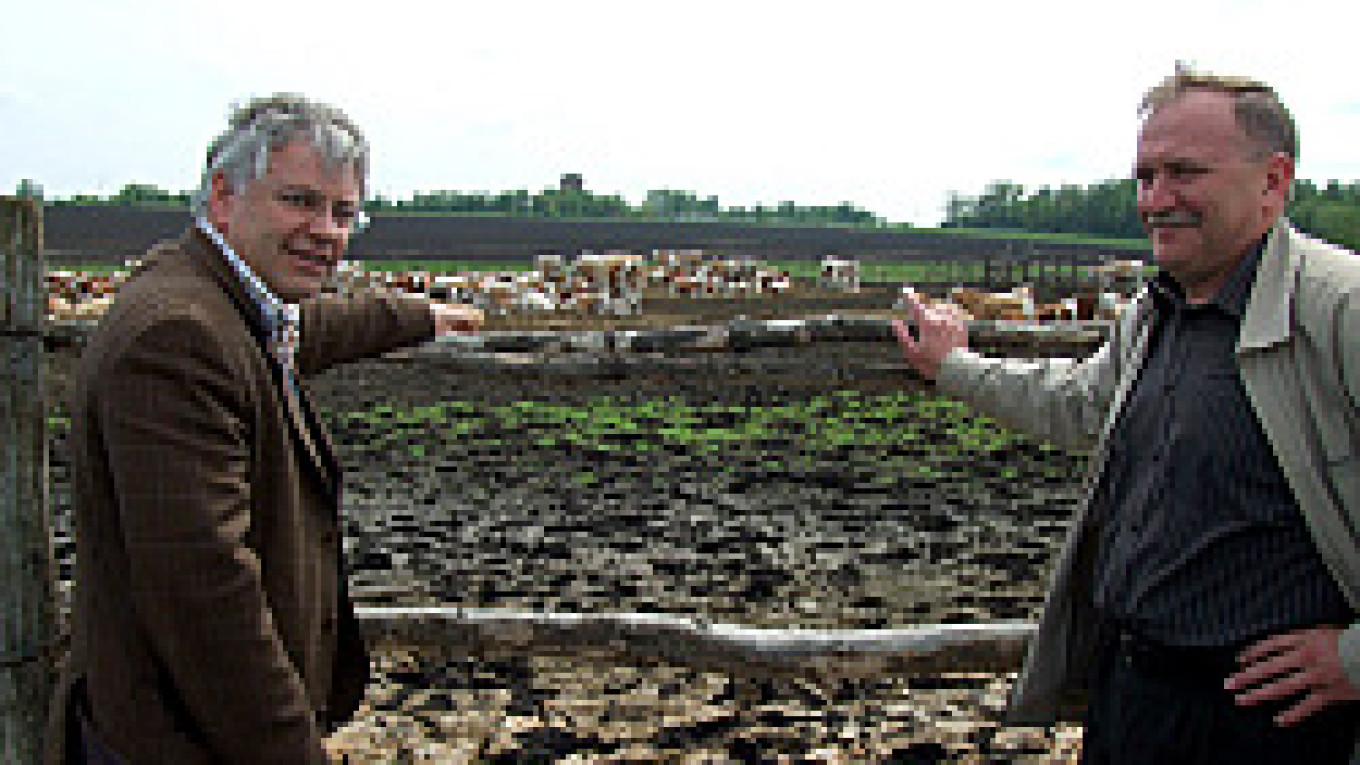But Mitin is not rolling in cash. Gazing out over his 13,000 hectares in the eastern part of the Lipetsk region, he said the problem was that his laborers needed to work harder and the bureaucrats in Moscow needed to regulate agriculture.
"There are hundreds of us producing grain, milk and meat in the region, and we all have the same problem — we lose out in the processing," Mitin said.
"A liter of milk costs 30 rubles in the store, but our cut of the sale is only 9 rubles. The same kind of situation exists with bread. We receive far fewer subsidies from the government than we need," he said.
The underdevelopment of the country's agricultural sector, combined with a lack of involvement from the state, is hindering growth even as the country is trying to sell more abroad. This means that Russian and foreign farmers in the country face the very real prospect of not being able to cash in on soaring world food prices.
The government has taken steps to boost exports, and Agriculture Minister Alexei Gordeyev declared in April that Russia wants to lead the world in grain sales within five years. Russia began to sell grain abroad in 2002 and quickly became one of the world's top-10 grain exporters. Today it places third, after the United States and Canada.
Farmers plan to export 17 million tons of the 88 million to 90 million tons of grain they expect to harvest this year. In 2007, 13.6 million tons were exported out of the 81.7 million harvested.
But industry insiders fear that this growth is only the result of a temporary situation and that, as conditions change, Russia will be unprepared.
"We rose to this high position as a result of the world food crisis," said Alexander Korbut, vice president of the Russian Grain Union, which advises the Agriculture Ministry on grain policy. "What we need now is to keep this position as grain prices begin to stabilize."

Nadia Popova / MT
Anatoly Mitin showing his 13,000 hectares of grain in the Lipetsk region. He would like more state regulations.
| |
Despite volatile prices, there are many reasons to be positive about the agricultural sector. The Russian Grain Union estimates that there are at least 18 million hectares of unused arable land in the country, and it is affordable. The cost of fertile, black-earth soil in Russia is 10 to 15 times lower than in Argentina and 60 times lower than in Sweden. But this potential is offset by substantial problems.
"A big problem exists with getting the grain out of the country," said Mark Lewis, a British national who serves as the production director in the Lipetsk and Tambov regions for Agro-Invest, a subsidiary of Sweden's Black Earth Farming. "For instance, the port at Novorossiisk is 18 months behind the schedule."
Black Earth Farming harvests 150,000 hectares of land in six regions through Agro-Invest. The company was one of the first Western firms to take advantage of Russia's fertile soil when it moved into the sector in 2006.
In December, the company raised more than $300 million when it listed on the First North alternative marketplace in Stockholm and remains very optimistic about its Russian operation.
"Russia has very strong competitive characteristics, as the grain quality is great and there is a lot of land left to be cultivated," Lewis said, walking through a field in Stanovoye in the western Lipetsk region, 470 kilometers southeast of Moscow.
"Here we produce the cheapest wheat in the world. The volume we produce is increasing, and we are going to export grain in several years — first to India, China and North Africa. Europe is the next stop," Lewis said.

Nadia Popova / MT
Crops being watered by a GPS-equipped vehicle on a Black Earth farm.
| |
Sven-Oliver Jungklaus, a researcher at the Institute for Agriculture Development in Central and Eastern Europe in Halle, Germany, hinted at other potential difficulties.
"For Russia to move into the leading position on the world agricultural market in a decade, I would suggest a mix of heavy state investment in the farming infrastructure and the creation of the free agricultural market," Jungklaus said.
The problems with Russia's agricultural infrastructure are substantial. Agro-Invest uses European machinery, including French-made combines. "The productivity of the Russian and foreign-produced machines differ significantly," Lewis said.
A French combine cultivates 4,000 hectares during the 14-day sowing season, while a Russian-produced one consumes three times as much fuel and sows as little as one-eighth as many hectares. Additionally, the French combine features a GPS system, which helps it sow seeds in a straight line.
"We see the key to our success in the use of foreign machinery and our foreign partners' love for long-term, detailed planning," said Lewis' Russian partner, Viktor Kornushin, who is responsible for Agro-Invest's Lipetsk fields.
Mitin, the Lipetsk farmer, agreed that there were infrastructure problems, but the ones on his mind were different from those that concerned his Western counterparts. He is happy with his Belarus brand tractors, produced in Minsk, and thinks that detailed planning is useless in Russia, preferring to "see what the future brings."
Mitin has spent his whole life in the village of Troitskoye, working first as the director of a collective farm before starting his own agribusiness in the early 1990s. Last year, his business earned revenues of about 14 million rubles, but most of his income went to paying the salaries of his 176 employees, making payments on his loans and buying seeds for the coming year.
Mitin said he is bothered by the lack of state regulation.
Ivan Myagkov, the local bureaucrat responsible for agriculture, said he felt Mitin's pain. "Processors of raw agricultural products are to blame for the rising price," Myagkov said. "Over the past nine months, the price of raw milk rose from 6 to 18 rubles per liter and then fell to 9 rubles, while the price of a liter in a store remained at a minimum of 30 rubles.
"But we don't have an authority to regulate that," Myagkov said. "It has to be decided on the federal level."

Nadia Popova / MT
People walking on a road surrounded by farmland in Lipetsk. Farmers fear they will soon have no work force left.
| |
"When Viktor Zubkov, a man who grew up in the village, is in charge of agriculture, we hope something will change," Myagkov said.
He disapproves of the state's current agricultural policy, however.
"The government thinking is quite controversial," Myagkov said. "They want us to develop cattle breeding but to begin importing milk from Ukraine and Belarus and meat from as far away as Argentina and Brazil."
Forty-six percent of the food products sold in Russia come from abroad, the Agriculture Ministry said.
Another problem Myagkov cited was the lack of money. "To do agribusiness, you need a lot of money banks can't give," he said.
State-owned Rosselkhozbank, which gives 50 percent of its loans to farmers, has received requests for 81.3 billion rubles in credit this year but can only give out 46 billion rubles, according to the Agriculture Ministry's web site.
Last month, Prime Minister Vladimir Putin tried to address concerns over rising food prices and shortages by assuring citizens that more investment will be poured into the agricultural sector. "We need to defend Russia's agriculture from the fluctuations of the world markets," Putin said during the Duma meeting that approved him as prime minister.
Putin announced that an additional 40 billion rubles would be invested into the sector this year — 30 billion through Rosselkhozbank and 10 billion to buy the feed required for chicken keeping and cattle breeding.
The government intends invest 551.3 billion rubles into the sector by 2012. Regional budgets will contribute approximately the same amount.
Western firms like Agro-Invest are not suffering from a lack of funds, but they have yet to find a way to be profitable. Gustav Weterling, Agro-Invest's manager for investor relations, said the company posted a net loss of $15.8 million in 2007.
"So far, we have been investing heavily," Weterling said. "We expect positive cash flow in 2009 and profit in 2010."
Regardless of the difficulties, Mitin remains optimistic. "Give Russia at least three more years to develop into a leading food producer," he said. "Gradually, we are developing new technologies, understanding that we should never use Russian-produced seeds and, probably, plan sometimes."
Mitin lost 2 million rubles from his cattle breeding operation last year, and in order to increase his profits, Mitin said he was thinking of buying his own pasteurization and packing equipment. "Vertical integration is what gets you money in this country," he said.
A Message from The Moscow Times:
Dear readers,
We are facing unprecedented challenges. Russia's Prosecutor General's Office has designated The Moscow Times as an "undesirable" organization, criminalizing our work and putting our staff at risk of prosecution. This follows our earlier unjust labeling as a "foreign agent."
These actions are direct attempts to silence independent journalism in Russia. The authorities claim our work "discredits the decisions of the Russian leadership." We see things differently: we strive to provide accurate, unbiased reporting on Russia.
We, the journalists of The Moscow Times, refuse to be silenced. But to continue our work, we need your help.
Your support, no matter how small, makes a world of difference. If you can, please support us monthly starting from just $2. It's quick to set up, and every contribution makes a significant impact.
By supporting The Moscow Times, you're defending open, independent journalism in the face of repression. Thank you for standing with us.
Remind me later.



